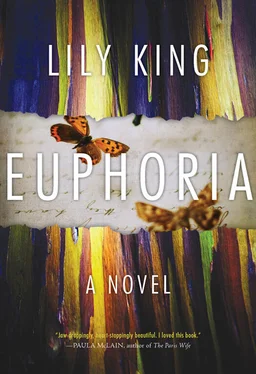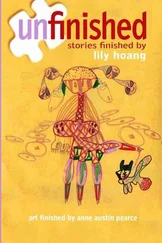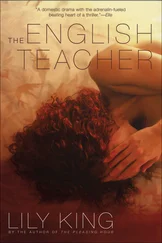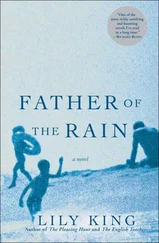Seven weeks. I waited seven full weeks and then I could not wait anymore. I got in the canoe before sunrise and gunned it, slaloming through black clouds of mosquitoes and the occasional croc drifting like a tree limb. The sky glowed a pale green, the flesh of a cucumber. The sun came up suddenly, too bright. It grew hot fast. I was used to the heat, but that morning, even moving swiftly in my canoe, I was overcome by it. Halfway there my vision began to sparkle and blacken, and I had to pull over briefly.
I knew the Tam were already a success by the greeting I got. The women in their canoes in the middle of the lake called out loud hellos that I heard over my engine, and a few men and children came down to the beach and gave me big floppy Tam waves. A noticeable shift from the chary welcome we’d received six weeks earlier. I cut the engine and several men came and pulled the boat to shore, and without my having to say a word two swaybacked young lads with something that looked like red berries woven in their curled hair led me up a path and down a road, past a spirit house with an enormous carved face over the entryway — a lean and angry fellow with three thick bones through his nose and a wide open mouth with many sharp teeth and a snake’s head for a tongue. It was much more skilled than the Kiona’s rudimentary depictions, the lines cleaner, the colors — red, black, green, and white — far more vivid and glossy, as if the paint were still wet. We passed several of these ceremonial houses and from the doorways men called down to my guides and they called back. They took me in one direction then, as if I wouldn’t notice, turned me around and doubled back down the same road past the same houses, the lake once again in full view. Just when I thought their only plan was to parade me round town all day, they turned a corner and stopped before a large house, freshly built, with a sort of portico in front and blue-and-white cloth curtains hanging in the windows and doorway. I laughed out loud at this English tea shop encircled by pampas grass in the middle of the Territories. A few pigs were digging around the base of the ladder.
From below I heard footsteps creaking the new floor. The cloth at the windows and doors puffed in and out from the movement within.
‘Hallo the house!’ I’d heard this in an American frontier film once.
I waited for someone to emerge but no one did, so I climbed up and stood on the narrow porch and knocked on one of the posts. The sound was absorbed by the voices inside, quiet, nearly whispery, but insistent, like the drone of a circling aeroplane. I stepped closer and pulled the curtain aside a few inches. I was struck first by the heat, then the smell. There were at least thirty Tam in the front room, on the floor or perched oddly on chairs, in little groups or even alone, everyone with a project in front of them. Many were children and adolescents, but there were men, too, and a few nursing mothers and elderly women. People moved across the room with purpose, as if they were in a bank or a newsroom, yet in a distinctly Tam style, weight back and bare feet making a sort of smooth slide forward. Every few minutes I had to turn my head to the side to take in cooler, less fetidly human outdoor air, like a swimmer turning for breath. The smell of humanity — without soaps, without washing, without doctors to remove the rot of teeth or limbs — is pungent even outdoors at a ceremony, but inside, with the blinds down and the fire lit to keep away the bugs, it’s nearly asphyxiating. Slowly I became aware, as I did my peering in and sipping of the air behind me, of all their belongings. I’d thought the two hundred porters to get up to the Anapa had been an exaggeration, but now I understood it had to be true.
They had brought bookshelves and a Dutch cabinet and a little sofa. At least a thousand books lined the shelves and spilled onto the floor in great piles. Oil lamps rested on end tables. Two writing desks in the large mosquito room. Boxes and boxes of paper and carbon. Photography equipment. Dolls, blocks, toy trains and rails, a wooden barn with animals, molding clay, and art supplies. And great coffers of things still unpacked. In the smaller mosquito room I could see a mattress, a real mattress, though it did not seem to have a box spring or frame, and sat on the floor looking swollen and out of place. I didn’t understand how it was that the Tam weren’t pawing over their things, pressing the typewriter keys and tearing pages out of books, as the few Kiona children I’d ever let in my house had done. Nell and Fen had established an order — and a trust — I’d never even aimed for.
Just when I thought I should stop spying and return to the center of the village to find them, a little boy in the corner shifted on his hip and I saw her. She was sitting cross-legged, a little girl in her lap and another brushing her hair. She held up a card to a woman facing her. The woman, whose son was nursing vehemently on a breast that looked tapped out, said something and they both laughed. Nell made a few notes then lifted another card. The Tam had a way of holding their chin out, as if someone were holding a buttercup beneath it, and Nell was holding her chin out this way, too. After she had gone through a small stack of cards, a man came and took the woman’s place. When Nell got up to get something on her desk, I saw she’d picked up their smooth glide as well.
The boy who’d moved was the one who saw me first. He hollered and she looked up.
She quieted down her guests and came to the doorway. ‘You’re here,’ she said, as if she’d expected never to see me again. I’d hoped for something a bit warmer. She was wearing Martin’s specs.
‘You’re working.’
‘I’m always working.’
‘All your things came. And they’ve built you a house,’ I said stupidly.
She was so small, Tam-sized, and I hung over her like a lamppost. Her hair had been brushed out by the little girl into a wild airy froth. Her wrists were too thin, but she looked rested and the color had come back to her face. I felt overwhelmed by the presence of her, which was even stronger in actuality than in memory. It was usually the reverse with me and women. I was aware now of how hard I’d tried six weeks ago not to find her attractive. I hadn’t remembered her lips and how the lower one dipped in the middle, brimming over. She wore a blouse I hadn’t seen, light blue with white spots. It made her grey eyes glow. She felt mine somehow, wearing my brother’s glasses. But she was formidable now, with her health and her work. She looked like she did not know quite what to do with me.
‘I didn’t want to miss the euphoria. I haven’t, have I? You said it happened at the second-month mark.’
She seemed to stop herself from smiling. ‘No, you haven’t.’ She looked back to the man to whom she’d been showing the cards. ‘We’d given up on you.’
‘I—’ Every face was turned to us and to our strange way of talking. Teket told me it sounded to him like cracking nuts. ‘I didn’t want to get underfoot.’ She continued to look at me through Martin’s glasses, which made her eyes comically round. ‘Remind me how to say hello.’
‘Hello and goodbye are the same. Baya ban,’ she said. ‘As many times as you can stand it.’ Then she turned to face the room. She pointed to me and spoke a few brief staccato sentences, fast but with no ear for the rhythm of the language, which surprised me. She went round the room telling me every person’s name and I said baya ban and the person said baya ban and I said baya ban and Nell cut that person short with the next person’s name. After she had introduced them all, she called to someone back behind the screen in what I assumed was the kitchen area, and two boys came out, a stumpy naked one with a theatrical smile, and a more reluctant tall one in long shorts, clearly Fen’s, tied tight at the waist with thick rope, his razor-sharp shinbones below. I exchanged greetings with each of them. Several of the children were giggling at Bani’s outfit and he quickly retreated behind the screen, but Nell called him back.
Читать дальше











